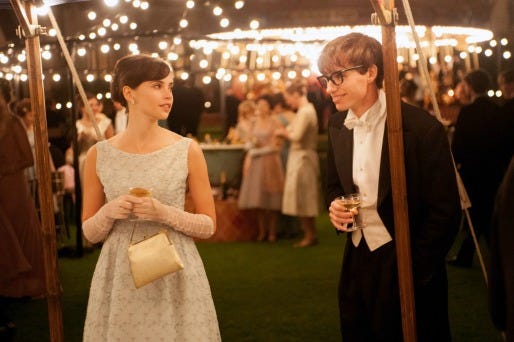The Theory of Everything

“The Theory of Everything” is a triumphant feature about the indomitable spirit of the individual.
A pair of splendid performances drives the movie, but like the cosmos that Professor Stephen Hawking studied in order to unravel the secrets of the universe, it is cold and distant.
While the film displays the fortitude and resourcefulness of Hawking (Eddie Redmayne) and his wife, Jane (Felicity Jones), it fails to give them any context before their fateful meeting at Cambridge in 1963.
What drove Hawking to his chosen field? How did he develop a personality that was part shy schoolboy and part arrogant scholar?
And what attracted Jane to this socially awkward individual? His intellect? His humor? “Everything,” unfortunately, does not reveal everything we want to know about these two strong-willed and intelligent people.
And the lack of answers, while only slightly damaging the film, is, nonetheless, frustrating.
At 21, Hawking is diagnosed with a debilitating disease and given only two years to live. He then embarks on what will be his lifelong work — the study of time. With Jane by his side, the two devise ways to adapt to his physical limitations. While Hawking’s body continues to deteriorate, his mind remains sharp and focused.
One of the film’s drawbacks is that it feels very clinical, failing to offer any truly emotional highs. The major tension rests with Jane putting aside her career and ambition, dedicating herself to taking care of Stephen so he can continue his work.
Director James Marsh uses subtlety to convey the resentment and frustration that, at times, overcomes Jane. Jones expertly uses expressions and body language to convey her interior turmoil, as well as her strength, determination and resolve. Meanwhile, Redmayne deserves an Academy Award nomination. He so embodies Hawking that you often forget it’s not the real man on screen.
The movie comes off as a rather idealized version of the Hawkings’ relationship and lives, however. It probably was filled with much more turmoil and problems.
“The Theory of Everything” is one of those feel-good, triumph-over-adversity biopics that Oscar voters love. And while that may sound flippant, it also conveys the film’s major flaw. “Everything” needed to show more warts; it would have been a much better film if its two main characters were not nearly elevated to the levels of sainthood.
“Everything” is an exceptional movie, but like Christopher Nolan’s “Interstellar,” it needed a larger dose of humanity.
Bob Bloom was the movie critic and Blu-ray/DVD reviewer for the Journal & Courier. You can follow Bloom on Twitter @bobbloomjc.



